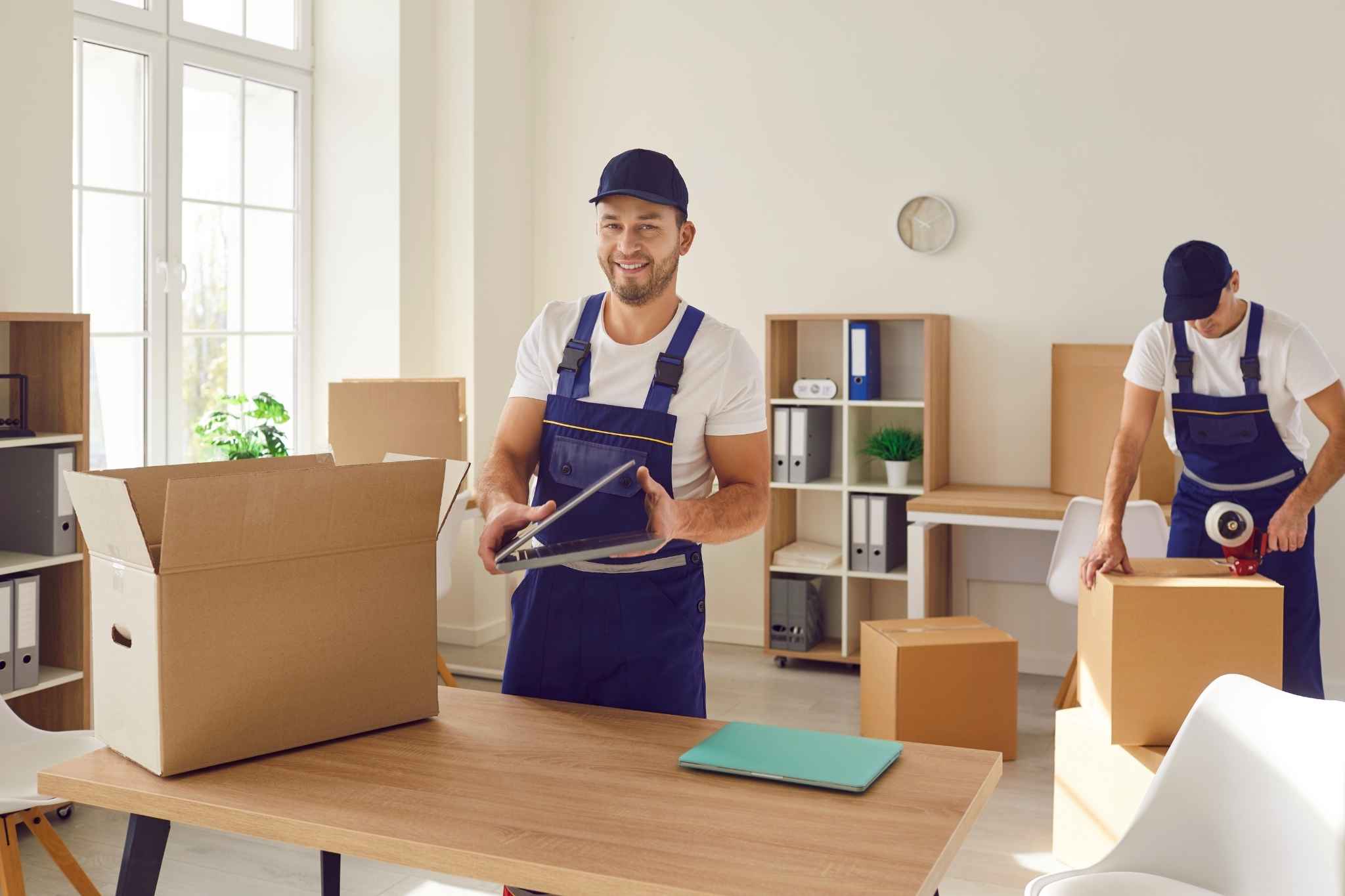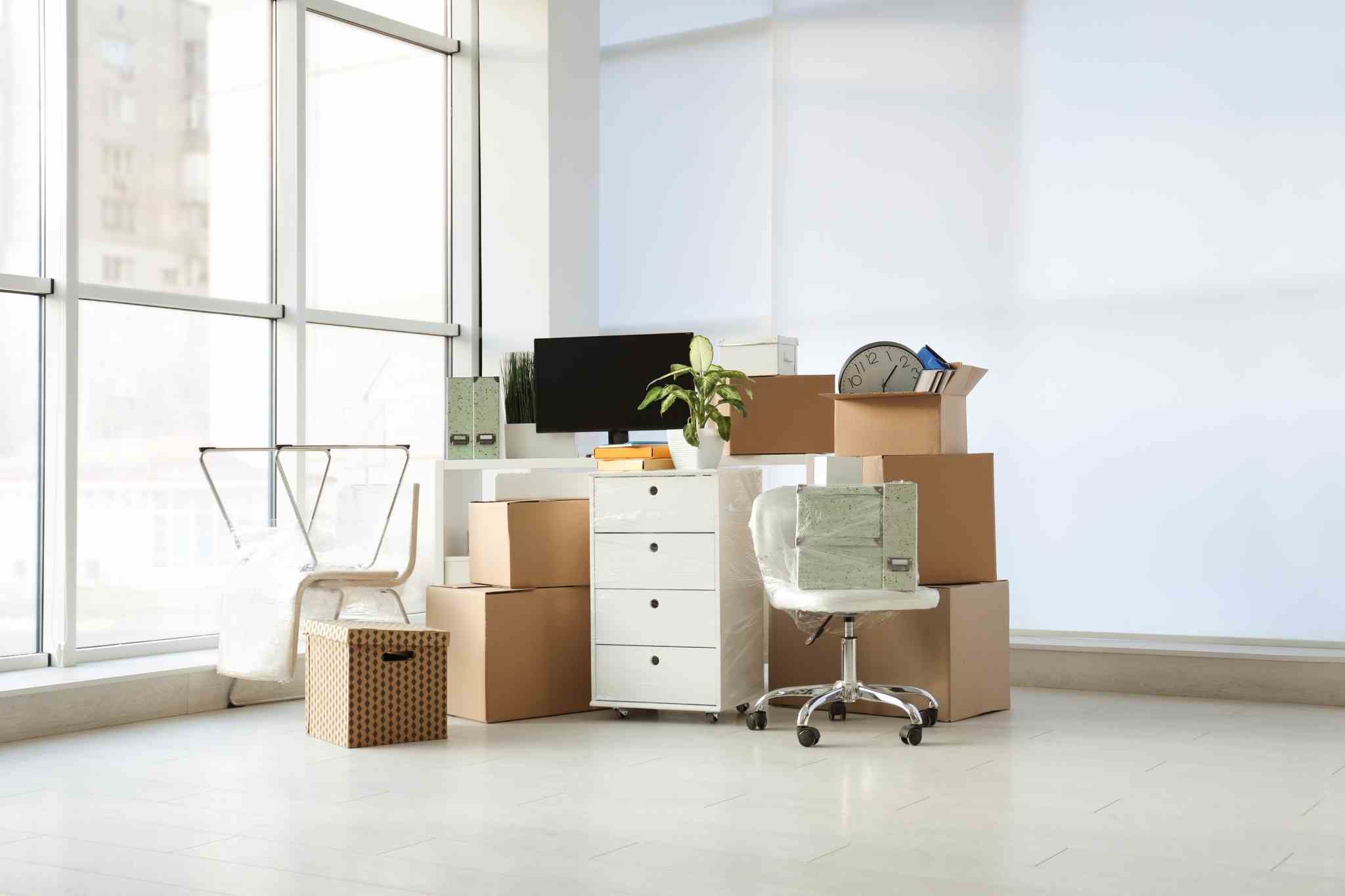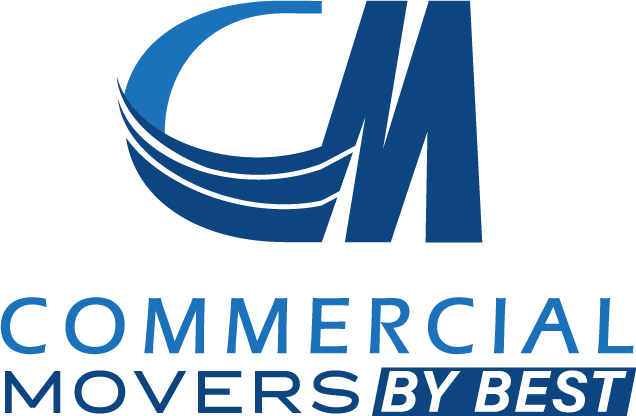Table of Contents
Key Takeaways
✔ Many moving companies offer boxes, but availability often depends on the type of service selected.
✔ Boxes come in various types, including standard sizes, specialty containers for electronics, and protective supplies like bubble wrap.
✔ Some movers include boxes in full-service packages, while others charge separately or offer rentals.
✔ Buying boxes independently or renting from third-party suppliers can be cost-effective alternatives.
✔ Comparing costs, timelines, and convenience helps determine whether to rent, buy, or rely on a full-service package.
Relocating an office is no small feat—it’s a high-stakes act that goes well beyond just shifting desks and unplugging monitors. One of the most underestimated challenges? Packing. From protecting fragile tech to keeping departments organized, how and what you pack sets the tone for the entire move.
According to a survey by business reviews site Clutch, most employees find office moves stressful but still feel the long-term advantages outweigh the hassle. Fortunately, having the right packing materials and boxes can reduce that stress significantly, making it easier to settle into the new space.
Here are the key details to know about box availability when hiring a moving company for an office move.

Do Moving Companies Typically Provide Boxes?
When planning an office move, one of the most common questions is: Do moving companies provide boxes? The answer depends on the company and the type of moving service selected. While most professional movers offer packing materials, not all of them include boxes in their standard packages.
Common Services Offered by Moving Companies
Many moving companies offer more than just transporting furniture. Their services can range from basic transportation to full-scale relocation solutions. Some companies may include boxes as part of their service, while others treat them as an add-on.
- Basic Moving Service: This usually covers loading, transporting, and unloading items only. Boxes and packing materials are not included.
- Full-Service Moving Package: This type of service includes everything from packing and labeling to disassembling furniture. Boxes are often included or available for an added cost in this package.
- Box Rental Services: Some movers provide reusable plastic crates for rent instead of offering cardboard boxes. This is convenient, eco-friendly, and saves clients from having to dispose of packaging afterward.
- Packing Material Costs: Costs for boxes, tape, bubble wrap, and labels can vary by company. Most movers can provide a price list or a quote based on the size and needs of the office.
Are Boxes Included or an Add-On?
Not all movers provide boxes automatically. Some offer them as part of specific service packages, while others allow clients to purchase or rent them separately. Understanding the differences between box rental vs box purchase can help businesses choose what fits best.
- Included in Full-Service Packages: Boxes and all essential packing materials are often included in these premium packages, but it’s always best to confirm what’s covered.
- Available for Purchase: Companies often sell boxes in various sizes, including specialty boxes for electronics or documents.
- Box Rental Options: Reusable box rental is another choice. It can be cost-effective for short-term moves and helps reduce waste.
- Optional Packing Services: If packing assistance is requested, companies may bundle boxes with the packing labor. However, this might increase the packing material costs overall.
Types of Boxes and Supplies Offered
When planning an office move, having the right packing materials is just as important as choosing the right movers. Many people ask, do moving companies provide boxes? In most cases, they do—but it depends on the type of service chosen. Some companies include boxes as part of a full-service moving package, while others offer them as add-ons or for purchase.
Standard Moving Boxes
Standard boxes are the most commonly used for packing up general office items. They come in various sizes to accommodate different needs and are typically made of durable cardboard that can handle everyday office equipment.
- Small Boxes: Ideal for heavy or compact items like paper reams, books, and office supplies. They’re easy to lift and prevent overloading.
- Medium Boxes: Best for items like keyboards, desk accessories, small electronics, and files. They offer a good balance between size and weight.
- Large Boxes: Used for lighter but bulkier items such as desk lamps, monitors (with padding), or soft goods like cushions and decorations.
Specialty Boxes
Specialty boxes are designed for specific items that require extra care or have an unusual shape. These boxes often include reinforced sides or built-in padding.
- Computer Boxes: Designed to fit desktops, monitors, or laptops safely. They may include foam inserts or anti-static packaging.
- File Boxes: Made to transport important documents in an organized way. Many come with lids and handles for easy access and lifting.
- Electronics Boxes: These boxes offer extra protection for items like printers, routers, and speakers. They are often double-walled and sometimes lined for shock absorption.
Additional Packing Supplies
Aside from boxes, moving companies also offer essential packing materials to protect office items and keep them secure during transport. These supplies are often available individually or bundled in a full-service moving package.
- Packing Tape: Strong adhesive tape to seal boxes and keep them secure during the move. Often sold in multi-packs or included in supply kits.
- Bubble Wrap: Protective cushioning for fragile items like glassware, electronics, or breakable office decor. It helps prevent cracks and scratches.
- Labels and Markers: Used to clearly mark boxes by category or room, making unpacking more efficient and organized.
- Packing Paper: A clean, ink-free alternative to newspaper. It wraps items without transferring color and helps fill empty spaces in boxes.
- Stretch Wrap: Useful for wrapping furniture or bundling cables and accessories. It protects against dirt and scratches during the move.
Free vs Paid Box Options
Many people wonder, do moving companies provide boxes for office moves? The answer depends on the company and the type of service booked. Some movers include packing materials in their quotes, while others offer boxes as extras. Understanding what’s included can help a business plan its budget more clearly.
Situations Where Boxes May Be Included at No Extra Cost
Some moving companies include boxes and basic supplies as part of their packages, especially if the move is larger or full-service.
- Included in Full-Service Moving Package: When a business books a full-service moving package, packing supplies like boxes, tape, and wrapping materials are often included in the cost. This reduces the need for separate purchases and makes the moving process easier to manage.
- Promotional Offers: Movers sometimes include free boxes during special deals or seasonal promotions to attract new business. These limited-time offers can help reduce packing material costs without compromising on quality.
- Corporate Relocation Agreements: If a company uses the same mover for multiple locations or repeat services, boxes may be bundled into a negotiated rate. This kind of arrangement is common for large offices with ongoing relocation needs.
When and Why a Company Might Charge for Boxes
Not all moves qualify for free packing supplies. Many companies charge separately for materials to keep base pricing competitive.
- Box Purchase Option: Most movers offer a variety of boxes for sale, including standard sizes and specialty containers. Businesses can choose exactly what they need, but this can increase overall moving costs if not planned.
- Custom or Specialty Boxes: Items like large monitors, framed artwork, or sensitive electronics often require reinforced or padded boxes. These specialty containers come with extra charges due to the added materials and protection they provide.
- Partial Service or Labor-Only Moves: In cases where a moving company is only hired to load and transport items, packing materials—including boxes—are not provided. Clients are expected to supply their boxes in advance of moving day.
Rental Options (e.g., Reusable Crates)
Some companies offer a rental option instead of selling boxes outright. This can be more efficient and environmentally friendly, especially for short-term use.
- Box Rental vs Box Purchase: Renting reusable crates is a smart alternative to buying cardboard boxes, especially for short-distance or same-city moves. These plastic bins are often sturdier and can hold more weight without risk of collapsing.
- Time-Based Rentals: Most moving companies rent crates by the week or for a set number of days, depending on the size of the move. The rental fee is based on how many crates are needed and how long they’re used.
- Added Convenience: Reusable crates are delivered before the move and picked up afterward, which eliminates the need to break down or dispose of boxes. They usually include features like built-in handles and lids, making them easier and faster to pack.
Alternatives to Moving Company Boxes
Not every office move has to rely on the packing supplies provided by the moving company. While many ask, do moving companies provide boxes, the answer often depends on the type of service booked. Some include them in a full-service moving package, while others offer them as a paid extra.
Buying Your Boxes
Some businesses prefer to purchase their boxes instead of relying on the moving company. This gives them full control over the size, quantity, and durability of the packaging used.
- Office Supply Stores: These retailers often carry moving boxes in bulk at affordable prices, including options designed for office equipment and files.
- Online Marketplaces: Websites like Amazon, Uline, or Walmart offer a large variety of packs that ship quickly and are easy to compare by cost and review.
- Big Box Retailers: Stores like Home Depot or Lowe’s carry heavy-duty moving boxes, which are ideal for items like monitors or bulk office supplies.
Renting From Third-Party Suppliers
For companies looking to avoid the waste and hassle of storing used boxes, box rentals are a great option. This method is often compared in the discussion of box rental vs box purchase.
- Plastic Crate Rental Services: These companies provide stackable, reusable plastic crates that are ideal for protecting electronics, files, and other office equipment.
- Scheduled Pickups and Deliveries: Most rental services deliver crates before the move and pick them up afterward, which helps save time and keeps the workspace clutter-free.
- Eco-Friendly Option: Reusable crates reduce waste and are more sustainable than cardboard alternatives.
Using Existing Packaging in the Office
Some businesses already have suitable containers on hand. Repurposing these materials can cut down on expenses and reduce the need to ask, do moving companies provide boxes, altogether.
- File Cabinets and Storage Bins: These can be locked and transported as-is or emptied and used for other items.
- Supply Boxes and Printer Paper Cartons: Sturdy cardboard boxes used for office supplies are strong enough to carry various items.
- Reusable Shopping Bags and Totes: If available, these can help move lighter items like cords, stationery, or personal belongings.
3 Tips for Choosing the Right Option
When planning an office move, deciding how to handle boxes and packing materials is just as important as choosing the movers themselves. Several factors can help determine which option is best, especially when comparing services, costs, and convenience.
1. Set Budget
Managing costs is often one of the biggest concerns during an office move, especially since expenses can add up quickly. On average, office moving costs start around $5,000, with many jobs ranging between $5,000 and $15,000 or more. Not all moving companies include packing materials in their base pricing, so it’s important to understand where extra charges—like boxes and supplies—might come in.
- Packing Material Costs: Some companies charge separately for boxes, tape, and wrapping materials, which can add up quickly if not accounted for ahead of time.
- Box Rental vs Box Purchase: Renting plastic crates from a moving company can sometimes be cheaper than buying cardboard boxes, especially for large moves.
- Full-Service Moving Package: This often includes packing materials, labor, and transportation. While it’s more expensive upfront, it might save time and reduce hassle later.
2. Plan Timeline
Office moves are usually time-sensitive. How much time is available will influence which option is the most practical.
- Fast Turnaround Needs: Renting boxes may save time since companies often deliver and pick them up, reducing cleanup after the move.
- Early Packing Schedule: Purchasing boxes allows the team to start packing earlier, especially if the move will happen in stages.
- Limited Availability: During busy seasons, both rented and purchased boxes may need to be reserved in advance, which can impact planning.
3. Consider Convenience
The ease of organizing, packing, and unpacking should not be overlooked. Choosing the most convenient option can prevent last-minute problems and reduce stress.
- Delivery and Pickup Services: Some movers provide delivery of packing materials and pickup of rented boxes, making logistics easier.
- Box Sizes and Types: Using the right sizes—like computer or file boxes—makes packing safer and more organized, especially for delicate office equipment.
- Labeling and Organization: Many rental services include label systems that help keep items grouped by department or purpose.
Frequently Asked Questions
What does a full-service move include?
A full-service move includes packing, loading, transporting, unloading, and unpacking of all items. Movers typically bring all necessary packing materials like boxes, tape, and bubble wrap. They also disassemble and reassemble furniture if needed. This type of service is designed to handle the entire move from start to finish.
How to calculate packaging material cost?
Start by estimating the number of boxes needed based on the size of the office or home. Then, add up the cost of each item, including boxes, tape, bubble wrap, and labels. Prices vary by size and type, so checking the mover’s pricing sheet or a local supplier helps. Don’t forget to include extras like specialty boxes for electronics or fragile items.
How do I ask for free cardboard boxes?
Ask the moving company directly if they offer free boxes as part of the service or with a full-service package. Some companies may include them in the quote or offer them during off-peak seasons. It’s also helpful to ask if they have any lightly used boxes available at no charge. Always confirm availability before relying on it.
Do movers put boxes in rooms?
Yes, most movers will place boxes in the rooms they’re labeled for, as long as clear labeling is used. It’s important to mark each box with its destination to make the process smoother. This step helps with quicker unpacking and better organization after the move. Check with the mover in advance to confirm this service is included.
Do movers put boxes or furniture in first?
Movers typically load furniture first to create a stable base in the truck. Boxes are added later to fill in the gaps and prevent shifting. This method helps protect fragile items and maximizes space. The same approach may be followed during unloading, depending on access and room layout.

Get Office Relocations Handled Professionally in White Plains, NY!
Make business moves easier with help from Commercial Movers By Best, a trusted provider in White Plains, NY. Whether it’s packing, transporting, or setting up a new office space, every step is covered with efficiency and care. With full-service options and experience in commercial moves, the process is designed to minimize downtime and protect valuable equipment. Proudly serving White Plains, NY, our team ensures every relocation is managed with professionalism from start to finish.
Contact Commercial Movers By Best today to schedule a reliable office move.


